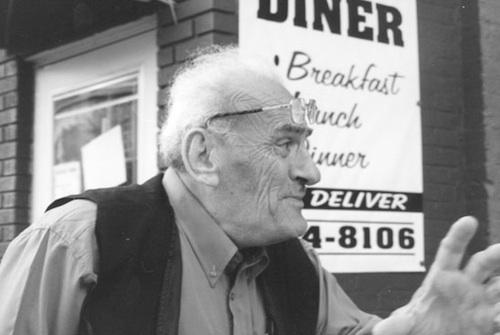Taha Muhammad Ali, 1931-2011
Renowned Palestinian poet Taha Muhammad Ali died on Sunday at the age of 80, reports Ma'an News Agency. Ali's poems "followed the experiences of Palestinians living in Israel, and Palestinian refugees around the world. They were translated into several languages, including English and Hebrew. Muhammad Ali grew in international acclaim after an Israeli-American writer Adina Hoffman wrote a biography of his life..." The New Yorker's Book Bench covered the biography's release in 2009:
Last night, at the CUNY Graduate Center, Adina Hoffman, the author of “My Happiness Bears No Relation to Happiness,” a new biography of the Palestinian poet Taha Muhammad Ali, flashed, on the wall, a fading photo of a slope covered with one-story homes, patches of low trees, and curved dirt paths—the Palestinian town of Suffuriya, circa 1931. Hoffman pointed to a house near the left side of the frame. Inside its walls, Taha Muhammad Ali was a week from being born.
Taha Muhammad Ali is now in his late seventies. Photographs of him tile the cover of Hoffman’s book—in most his head is propped up with a hand, as though he is nearly too weak for the task. His face is deeply wrinkled, and his lips flop together. There’s a self-acknowledging humor in the pose, though, and, according to Hoffman, in the man. Other photos, from Muhammad Ali’s souvenir shop—The Prominent Souvenir Center of Nazareth—attest to his playfulness: “Nicer Than You Imagine. Cheaper Than You Expected,” and to his intelligence: “A Thing of Beauty is a Joy Forever” from Keats’s “Endymion.” An autodidact—he left school at the age of eleven to support his family—Muhammad Ali loves John Steinbeck, or, as he pronounces it, “Shteinbeck.” He identifies strongly with “Cannery Row.”
Later, Hoffman put up a photo of present-day Suffuriya. Barely a structure remains, and the land has become a pine grove. No one lives there; it is preserved through Muhammad Ali’s poetry, and now through Hoffman’s book, a history that reads in some parts like a mystery.
A man in the audience asked whether Muhammad Ali’s family had been forced to leave Suffuriya in 1948, or whether they had fled by choice. “It’s complicated,” Hoffman answered.
An interview with Hoffman about the biography was published online in BOMB in November of last year. Hoffman said:
Rather than a book focused exclusively and probably in more conventional fashion on this one remarkable poet and person, it wound up emerging as something much more expansive. Because it’s not just that Taha himself isn’t especially well known, but that the very culture he comes from, the literature that matters to him, the language he speaks, the history and politics that have shaped him are so basically unknown—or if known, so often misunderstood—in the West. As I entered into Arabic and the multiple human and literary realms that became available to me through the language, the shape of the book opened out and I realized that Taha and his poetry would be the anchor for this more sweeping tale—what I ended up calling in the subtitle A Poet’s Life in the Palestinian Century.
Poet and SLS founder Mikhail Iossel points us to this video of Muhammad Ali reading poems in Arabic, with English translations from Peter Cole:
Taha Muhammad Ali (with Peter Cole) from Neil Astley on Vimeo.
Taha Muhammad Ali (with Peter Cole) from Neil Astley on Vimeo.
You can also read and listen to Muhammad Ali's poems here at PBS News Hour. Our sincerest condolences and respect to the poet's friends and family.



